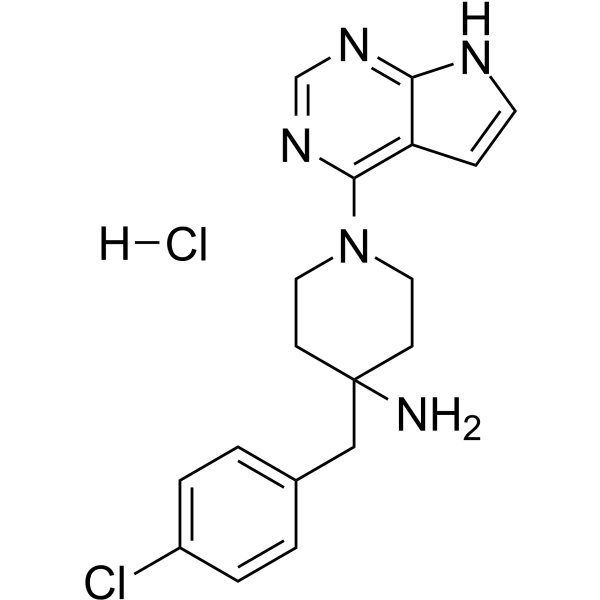CCT128930 hydrochloride |
| Katalog-Nr.GC63539 |
CCT128930-Hydrochlorid ist ein potenter und selektiver Inhibitor von AKT (IC50=6 nM). CCT128930-Hydrochlorid hat eine 28-fache SelektivitÄt gegenÜber der eng verwandten PKA-Kinase (IC50 = 168 nM) durch das Targeting von Met282 von AKT (Met173 der PKA-AKT-ChimÄre) sowie eine 20-fache SelektivitÄt gegenÜber p70S6K (IC50 = 120 nM) . CCT128930-Hydrochlorid induziert Zellzyklusstillstand, DNA-SchÄden und Autophagie. Antitumor-AktivitÄt.
Products are for research use only. Not for human use. We do not sell to patients.

Cas No.: 2453324-32-6
Sample solution is provided at 25 µL, 10mM.
CCT128930 hydrochloride is a potent and selective inhibitor of AKT (IC50=6 nM). CCT128930 hydrochloride has 28-fold selectivity over the closely related PKA kinase (IC50=168 nM) through the targeting of Met282 of AKT (Met173 of PKA-AKT chimera), as well as 20-fold selectivity over p70S6K (IC50=120 nM). CCT128930 hydrochloride induces cell cycle arrest, DNA damage, and autophagy. Antitumor activity[1][2].
The GI50 values of CCT128930 hydrochloride for growth inhibition are 6.3 μM for U87MG human glioblastoma cells, 0.35 μM for LNCaP human prostate cancer cells, and 1.9 μM for PC3 human prostate cancer cells, all of which are PTEN-deficient human tumor cell lines[1].CCT128930 (0.1-60 μM; 1 hour; U87MG human glioblastoma cells) hydrochloride shows an initial induction of AKT phosphorylation at serine 473 up to 20 μM, followed by a decreased in phosphorylation at higher concentrations[1].CCT128930 hydrochloride inhibits direct substrates of AKT (Ser9 GSK3β, pThr246 PRAS40 and pT24 FOXO1/p32 FOXO3a) at ≥5 μM, and the downstream target, pSer235/236 S6RP at ≥10 μM, with generally constant levels of the respective total proteins and GAPDH[1].CCT128930 (18.9 μM; U87MG human glioblastoma cells) hydrochloride causes an increase in phosphorylation of pSer473 AKT after 30 minutes, which is sustained for 48 hours. Total AKT protein signal decreases gradually from 8 hours to 48 hours of treatment[1].CCT128930 (PTEN-null U87MG human glioblastoma cells; over a 24-hour time period) hydrochloride results in an increase in G0/G1 phase cells from 43.6% to 64.8% after 24 hours of treatment[1]. CCT128930 (0-10 μM; 24 hours) hydrochloride increases, but not inhibites, the phosphorylation of Akt in HepG2 and A549 cells. CCT128930 (0-20 μM; 24 hours) hydrochloride inhibits cell proliferation by inducing cell cycle arrest in G1 phase through downregulation of cyclinD1 and Cdc25A, and upregulation of p21, p27 and p53. CCT128930 (20 μM) hydrochloride triggers cell apoptosis with activation of caspase-3, caspase-9, and PARP. CCT128930 (0-20 μM; 24 hours) hydrochloride increases phosphorylation of ERK and JNK in HepG2 cells. CCT128930 (0-20 μM; 24 hours) hydrochloride activates DNA damage response of HepG2 cell characterized by phosphorylation of H2AX, ATM (ataxia-telangiectasia mutated), Chk1 and Chk2[2].
CCT128930 (25 or 40 mg/kg; i.p. daily or twice daily for 5 days) hydrochloride shows antitumor activities in U87MG and BT474 human breast cancer xenografts[1].Summary of the pharmacokinetic parameters of CCT128930 (25 mg/kg) in CrTacNCr-Fox1nu mice[1] Tissue Route T1/2 (h) Tmax (h) Cmax (μM) Vss (L) Cl (L/h) AUC0-∞ (µMh) Bioavailability (%) Plasmai.v.0.950.083 6.36 0.25 0.325 4.62100 Plasmai.p.2.330.51.28N/A0.372 1.3328.8 Tumori.p.3.8918.02N/A0.06*25.8N/A Plasmap.o.0.570.50.432N/A0.3170.3928.5*Apparent clearance.
[1]. Yap TA et al. Preclinical pharmacology, antitumor activity, and development of pharmacodynamic markers for the novel, potent AKT inhibitor CCT128930. Mol Cancer Ther. 2011 Feb;10(2):360-71.
[2]. Wang FZ, et al. CCT128930 induces cell cycle arrest, DNA damage, and autophagy independent of Akt inhibition. Biochimie. 2014;103:118-125.
Average Rating: 5 (Based on Reviews and 25 reference(s) in Google Scholar.)
GLPBIO products are for RESEARCH USE ONLY. Please make sure your review or question is research based.
Required fields are marked with *




















